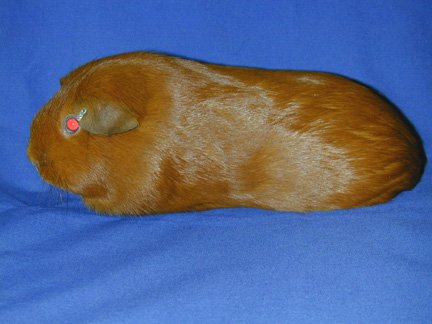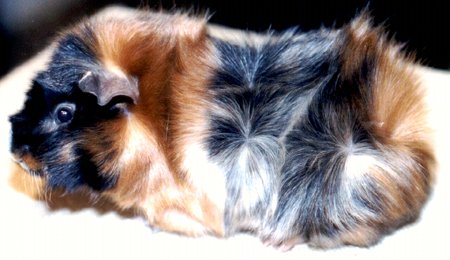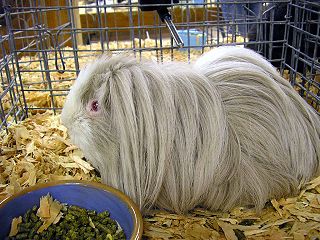Caring for Guinea Pigs
Guinea Pigs have been known around the world as a great pet for over 400 years!! They have a calm temperament, aare not aggressive, and rarely if ever scratch or bite an owner. The pets are popular Christmas gifts and are perfect for teaching children how to care for an animal. The pets are often raised in pairs since they are social animals and are more at home when they have another pet to sleep against. These pets can be purchased from a breeder or pet store, or, adopted from a local animal rescue or shelter.

About Guinea Pigs:
Here are some links to find the Guinea Pig information you are looking for fast or find all of the information listed in order below:- Where are tjeu From?
- Breeds
- Lifespan
- Cost of Ownership
- Normal Weight
- Gestation
(time in womb and age when adult)
- Cages, Litter and Room Temperature
- Diet
- Sounds
- Exercise and Play
- Veterinary Care and Common Diseases
- Ask Our Vet a Question
Where are Guinea Pigs From?
They can still be found in the wild in South America in areas that are on the edges of forests, swamps, rocky areas and grasslands. . Here are the facts you need to know when considering them as a Pet.Guinea Pig Breeds
There are many Breeds, but there are three breeds that are raised as pets. Within each breed you can find differences in color and hair type.- English, American or Common

American Breed
- Varieties:
- Short Hair
- Straight Hair
- Fine Hair
- Abyssinian

Abyssinian with Color Rosettes
- Varieties:
- Rough Hair
- Wiry Hair in whorls or rosettes (circles of color)
- Peruvian

Long Hair Peruvian
- Varieties:
- Long Hair
- Silky Hair
- Straight Hair
How Long Do Guinea Pigs Live?
They can live from 4 to 8 years, and an average of 5 years in captivity (as a pet).Cost of Ownership
Among all pets, only owning a bird or fish costs less than taking care of one of these pets.| One
Time Costs: |
|
| Cage |
$70 |
| Annual
Costs: |
|
| Food |
$105 |
| Medical Care |
$70 |
| Litter |
$415 |
| Toys/treats |
$30 |
| Total |
$70
plus $620 a year (U.S. Dollars) |
Weight
- Birth Weight: .13 lbs (60g) - .24 lbs (110g)
- Adults Weight
- Males: 1.98 lbs (900g) - 2.6 lbs (1200g)
- Females: 1.654 lbs (750g) - 1.98 lbs (900g)
Breeding, Gestation and Age at Maturity
Guinea pigs are in the mother's womb for 59 to 72 days. The average litter is 4, with a range of 1 to 6. Males are considered adults at age 9 to 10 weeks, while females are adults (at maturity) at 6 weeks.Cages,
Litter and Room Temperature
The key to a good Guinea Pig Cage is to keep it simple. They should be
kept in approximately 200 square inches (4ft x 4 ft or 1.2 meters
x 1.2 meters) of floor space withCage floors should be solid, not mesh. Shown right Midwest Interactive Habitat Plus which features 9 square feet of living space and separate play and care areas.
Litter:
They are not a particularly neat animal and will quickly make a mess which includes feces and urine. Bedding should be changed frequently to avoid odor. Do not use litter made pine and cedar. These materials contain oils that can be toxic for your pet.
Room Temperature:
Guineapigs should be kept in a room that is 65° to 79° F (18° to 26° C). Avoid hotter temperatures or very humid environments.
What Does a GuineaPig Eat?
A GuineaPig primarily eats specially fortified pellets. Pellets should be fortified with vitamin C and should be consumed within 90 days of the mill date on the package. After this date the vitamin C content of the food declines.The diet is supplemented by green Timothy hay (do not use brown or yellow).
Small portions of fruits and vegetables also help to round and the diet and provide a source of vitamins. Wash all items before putting in the cage and to avoid spoilage, remove after several hours.
Once you establish a diet for your young pet, do not change it as this can cause gastrointestinal probelms. You pet may refuse to eat new diets.
Vegetables for your Pet:
- Top Choices (excellent source of vitamin C for your pet)
- Collards
- Mustard Greens
- Dandelion Greens
- Kale
- Brussel Sprouts
- Parsley
- Good Choices
- Broccoli Leaves
- Beet Greens
- Cauliflower
- Broccoli florets
- apples
- grapes
- orange slice (can be provided daily)
Dietary Supplements
If you buy a Vitamin C fortified food than supplements should not be necessary. If you do not than provide 10-30mg of Vitamin C per day.Water
Include a sipper type water bottle affixed to the side of the cage or a stainless steel bowl. The bowl can get messy so if you have a choice, go with the bottle. Replace the water every day. When changing the water check the bottle to make sure that it works (food pellets can block the opening). Wash the bottle weekly to avoid any bacteria.Sounds
The animals are known to vocalize and make a range of noises that can only be described as whines, tweets, purrs, squeals, chirps and grunts. They can also whistle.Exercise and Play
One of the joys of ownership is being able to play with your pet outside of the cage. Guineapigs like to play outside the cage, but will chew anything in their site. To stay on the safe side block off an area of a room for play and remove any electrical wires or other items that can cause harm when chewed.Veterinary Care
Like all pets, a guineapig should be check by a veterinarian at least 1x per year. A typical exam will include a blood test and a test of the feces. The veterinarian will also check the teeth and gums for any dental diseases. Common disease include:- Mange mites
- Respiratory infection
- Ovarian cysts
- Bladder stones
If you suspect a health issue, you can click here to consult with an online veterinarian that is available 24 hours a day. You can also fill out the form below and we'll answer your question as soon as we can.
Have a Question for Our Vet About Guinea Pig Health or Care
Do you have a question about guinea pig health or care? Ask and our Vet will answer it for free!
Please be sure to include important information such as age, breed, diet, medications, advice from your veterinarian or anything else you believe would be helpful.
It also helps to include a picture, especially when asking about skin or coat problems.
Every week we will select questions to be answered by our Vet. If you need an urgent response, we suggest using this online veterinary service that has Veterinarians standing by 24 hours a day.
What Other Visitors Have Asked and Suggestions from the Vet
Click below to see what other visitors to this page asked and shared with us...
Guinea Pigs Teeth Dog Not Line Up Not rated yet
What should i do if my Guinea Pigs teeth don't line up together?
Vet Suggestion Guinea Pig Teeth That Do Not Line Up
Hello Madison,
I’m …
References:
UC Davis VMTH
For more information download this summary of How to Care for Your Pet (PDF) from UC Davis.
Related articles
Accessories
FAQ
As a Pet
Bedding
Breeds
Go from Guinea Pigs
as Pets to Cool Small Pets home page
Comments
Have your say about what you just read! Leave me a comment in the box below.